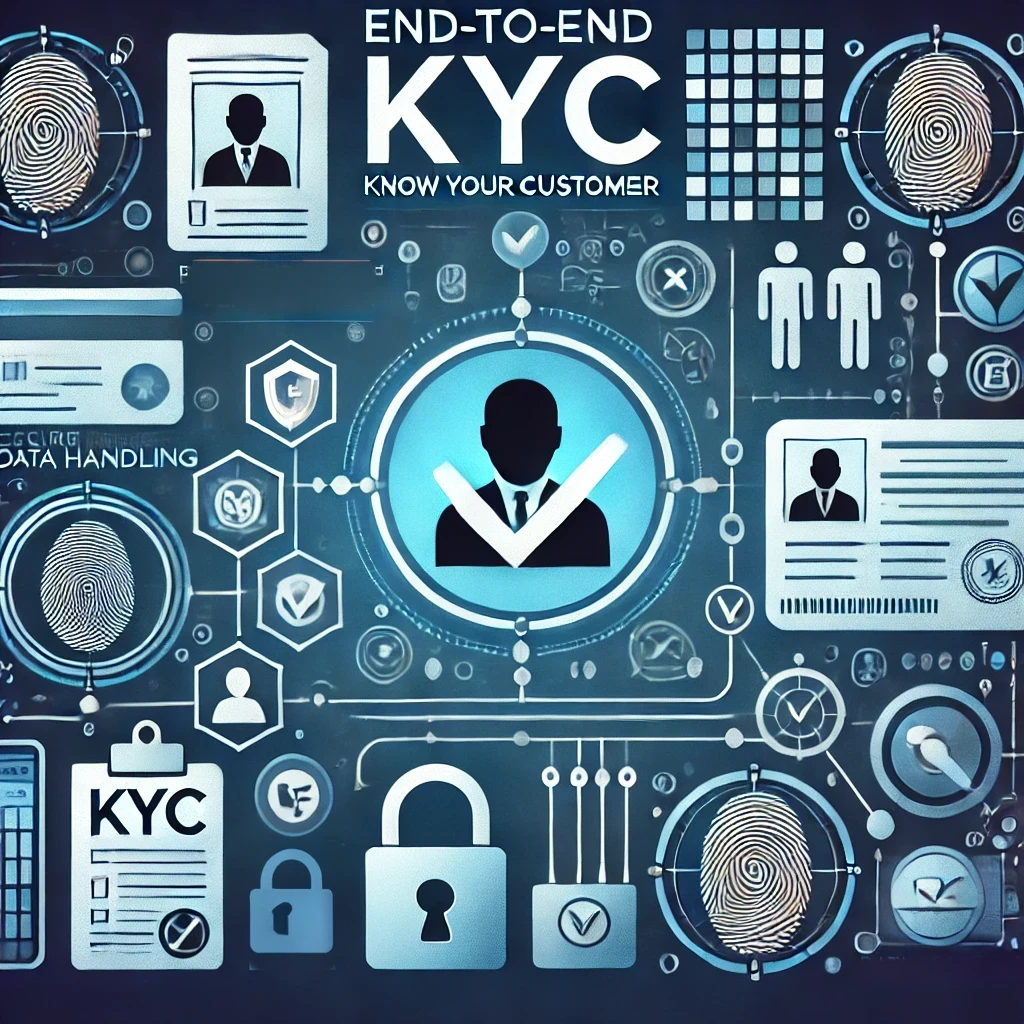Ensuring compliance with legal and regulatory standards remains a top priority for financial institutions. Non-compliance can result in hefty fines, reputational damage, and even legal action. Two key compliance processes are KYC (know your customer) and due diligence. While these terms are often used interchangeably, they refer to different processes that serve distinct functions.
In this article, we will explore the differences between KYC and due diligence. We will also examine the importance of each process and how they work together to ensure compliance. By the end of this article, readers will gain a deeper understanding of these two critical compliance processes, including best practices for carrying them out effectively.
Understanding KYC
KYC stands for “Know Your Customer” and it is a process used by financial institutions to verify the identity of their clients. It involves obtaining information about a customer’s identity, address, and financial history. The purpose of KYC is to prevent money laundering, terrorism financing, and other illegal activities.
Financial institutions must adhere to strict regulations when conducting KYC checks. For example, they must obtain original or certified copies of identification documents such as passports or driving licenses. They must also verify the source of a customer’s funds and determine whether they have any links to criminal activities.
The KYC process is an essential requirement for many financial services such as opening bank accounts, obtaining loans or credit cards. Customers may find the process frustrating or time-consuming but it helps protect them as well as the institution from fraudsters and criminals.
In recent years, digital KYC has become more popular due to its convenience and speed. Online verification methods such as facial recognition technology can now be used to establish a client’s identity remotely without having to visit a branch in person.
Why KYC is important
KYC is a process that requires financial institutions to identify and verify the identity of their clients. It might seem like a simple process, but KYC is an integral part of the financial industry as it helps to prevent money laundering and fraudulent activities.
KYC is essential for financial institutions in order to reduce their risk exposure and avoid reputational damage. It enables them to have a comprehensive understanding of their customers, including their sources of income and transactions, thereby helping them identify any suspicious activities that may be associated with money laundering or terrorist financing. This information allows them to take necessary steps to prevent such activities from occurring.
Through KYC, financial institutions can also comply with regulatory requirements set by anti-money laundering (AML) policies. By having accurate customer information through KYC checks, the institutions ensure that they are complying with these regulations while also protecting themselves from legal repercussions in cases where they might be liable for not having performed due diligence.
The importance of KYC cannot be overstated as it helps financial institutions build trust with their customers by ensuring compliance with regulatory requirements while also protecting themselves from reputational damage or being exposed to criminal activity. For example, if an institution fails to carry out proper KYC checks on a client who turns out to be involved in illegal activity, it could lead to significant losses for the institution’s shareholders as well as damage its reputation among other stakeholders.
Is KYC part of due diligence?
KYC and due diligence are two terms that are often used interchangeably, leading to confusion when it comes to understanding their differences. To answer the question directly, KYC is a part of due diligence, but it is not the same thing as due diligence. Due diligence refers to the entire process of investigating and verifying the identity, background, and financial history of a person or entity before entering into a business relationship with them.
KYC specifically refers to the process of verifying the identity of an individual or entity by collecting information such as their name, address, date of birth, and proof of identity documents such as passport or driver’s license. This information is then verified through various checks against government databases and other sources.
The main difference between KYC and due diligence is that KYC is just one aspect of due diligence. While KYC focuses only on identifying an individual or entity before starting a business relationship with them, due diligence goes beyond verification to include assessing potential risks associated with doing business with them.
In summary, while KYC is a crucial part of conducting proper due diligence on an individual or entity before entering into a business relationship with them; performing only-know-your-customer-checks without conducting proper due-diligence can lead to unforeseen risks for businesses in the long run.
The Basics of Due Diligence
Due diligence is an essential process that every business needs to go through before engaging in any financial transaction with a new partner. It is a comprehensive investigation and assessment of a company’s financial health, management structure, legal status, and market position. There are three types of due diligence – commercial, financial and legal due diligence.
Commercial due diligence involves understanding the target market and assessing the competitive landscape to evaluate the potential for revenue growth. Financial due diligence focuses on analysing financial statements to assess the target company’s profitability, cash flow, outstanding debt obligations, and other financial metrics. Legal due diligence seeks to identify any potential legal risks or liabilities that may arise from proposed transactions or partnerships.
Different industries have different approaches to conducting due diligence. For example, in mergers and acquisitions (M&A), it is customary for buyer companies to carry out thorough due diligence on the target company before making an offer. This helps them understand what they are buying into and can help them avoid any costly surprises down the line.
Due Diligence requires careful preparation as well as being meticulous while carrying out investigations. The process often involves examining thousands of pages of documents such as contracts, agreements, leases among others which can be overwhelming but necessary when done right saves businesses from entering into deals that could potentially harm their investments.
Comparing KYC and Due Diligence
Although KYC and due diligence are similar concepts, they are not the same thing. While KYC is a subset of due diligence, it is much narrower in scope. KYC focuses on verifying the identity of an individual or entity to ensure compliance with regulatory requirements. Due diligence, on the other hand, is a broader process that involves assessing risks and determining if a business relationship or transaction is worth pursuing.
A key difference between KYC and due diligence lies in their objectives. The purpose of KYC is to establish the identity of a customer or counterparty and assess potential money laundering risks associated with that individual or entity. Due diligence, on the other hand, involves conducting an investigation into a person or company’s background to gain an understanding of their history, reputation, financial stability, legal status and operational capability.
Another important distinction between KYC and due diligence relates to the level of scrutiny involved in each process. With KYC, organisations typically focus on collecting basic information such as name, address and date of birth from customers as part of their customer identification program (CIP). In contrast, due diligence requires more in-depth analysis such as conducting background checks on key individuals within an organisation.
It’s worth noting that while both processes share some similarities in terms of data collection methods (such as requesting identification documents), there are still differences between them. For example, while both processes may require similar information from customers (such as name and address), due diligence may go further by requiring additional information related to background checks or financial information about key individuals within an organisation.
Importance of combining KYC and Due Diligence
While KYC and due diligence are two distinct concepts, they are complementary in their objectives. Combining the two processes can enhance an organisation’s ability to mitigate risks and reduce the likelihood of fraud or financial crime.
The integration of KYC into due diligence is critical because it helps to verify the identity of customers and ensure that they are not involved in any illicit activities. By conducting proper background checks, organisations can identify potential red flags about customers that would otherwise go unnoticed.
Moreover, combining KYC with due diligence helps to streamline processes and reduce operational costs. Many financial institutions spend significant resources on conducting multiple checks on the same customer, but by integrating both processes, these institutions can avoid duplication of efforts and save time as well as money.
In addition, combining KYC with due diligence helps organisations to stay compliant with regulatory requirements. By ensuring that all relevant information is gathered about a customer before engaging in business transactions with them, organisations can be assured that they are meeting their legal obligations.
How to carry out KYC and Due Diligence
The KYC Process
The KYC process is essential when dealing with any financial transaction. It involves verifying the identity of a customer or client, assessing the risks that come with the transaction, and understanding their financial background. To initiate the KYC process, you need to collect relevant information from your client. The information collected should be from an independent source like a government-issued ID card or passport.
Once you have collected the necessary information, you should analyse it to verify its authenticity. Depending on the regulations in your jurisdiction, you may also need to conduct further investigations like checking for any criminal records or politically exposed persons (PEPs).
After conducting due diligence on your client’s personal and financial background, you can complete the KYC process by creating a risk profile for them. This risk profile will help determine whether they fall under low-risk or high-risk categories.
The Due Diligence Process
The due diligence process helps determine whether a business deal is worth pursuing by assessing the potential risks involved in it. The purpose of this process is to provide accurate information about all aspects of a business – operations, finances, and legal issues among others – so stakeholders can make informed decisions.
To start this process, identify all parties involved in the transaction and request essential documents such as contracts, agreements, financial statements etc. Once you have this documentation, conduct research into all aspects of their business history and their track record for similar transactions.
After collecting all critical data related to your investment opportunity or partnership venture with another entity: – Analyse whether there are any regulatory hurdles that could hinder completion of the transaction. – Review any potential legal issues. – Evaluate environmental factors that could potentially affect success. – Assess any financial factors that could be a concern. – Determine whether or not the deal fulfills your business objectives.
Best Practices and Compliance Standards for KYC and Due Diligence
It is essential to follow best practices when conducting KYC and due diligence processes. You should comply with all applicable laws and regulations, including anti-money laundering (AML) regulations. A good KYC program should also include ongoing monitoring of business relationships to ensure that no red flags occur during the course of time.
Some best practices include: – Keep accurate records of all client information collected. – Use technology to speed up the process when possible. – Ensure staff are properly trained in both processes. – Have a risk-based approach that helps you prioritise which clients require more due diligence. If you follow these best practices, it will help ensure that risks are appropriately mitigated, and your business stays compliant with all applicable regulations.
Best Practices and Compliance Standards for KYC and Due Diligence
Proper Documentation
One of the key best practices for KYC and Due Diligence is proper documentation. Financial institutions must keep accurate and up-to-date records of all customer information, including identification documents, account details, transaction logs, and risk assessments. The documentation should be stored in a secure location with restricted access to authorized personnel only. By ensuring that all customer data is properly documented, financial institutions can better manage their risks and comply with regulatory requirements.
Periodic Reviews
Another best practice for KYC and Due Diligence is periodic reviews of customer information. Financial institutions should regularly update their records to ensure that customer data remains accurate and up-to-date. Periodic reviews help identify any changes in a customer’s risk profile or behavioural patterns that may require additional scrutiny or investigation. By conducting periodic reviews, financial institutions can identify potential issues early on, mitigate risks, and comply with regulatory requirements.
Risk-Based Approach
A risk-based approach is another essential best practice for KYC and Due Diligence compliance. This approach involves assessing the level of risk posed by each customer based on factors such as their location, industry sector, transaction activity, source of funds or wealth, etc. As part of this approach, financial institutions should establish risk profiles for customers at account opening or during periodic reviews based on the assessed level of risk they pose to the institution. This enables financial institutions to focus their resources on higher-risk customers while applying more streamlined due diligence procedures to lower-risk customers.
Staff Training & Awareness
Finally, training staff members on KYC and Due Diligence compliance standards is another critical component in achieving best practices in this area. Financial institutions should provide regular training to staff members on KYC and Due Diligence procedures, including the identification of suspicious activity, record-keeping requirements, risk assessment techniques, and other relevant compliance standards. This training helps to ensure that all staff members understand their role in complying with KYC and Due Diligence regulations and can identify potential risks or issues effectively.
By adopting these best practices for KYC and Due Diligence, financial institutions can achieve greater levels of compliance with regulatory requirements while mitigating the risks associated with financial crime. Proper documentation, periodic reviews, a risk-based approach, and staff training are all critical components in achieving effective KYC and Due Diligence compliance.
Compliance Risks involved in KYC and Due Diligence
Compliance risks are significant concerns for companies that undertake KYC and due diligence processes. Any failure to comply with regulations and standards can lead to legal consequences, including fines and reputational damage. Hence, the need for companies to maintain high compliance standards cannot be overstated.
One of the compliance risks associated with KYC is the risk of providing incomplete or false information when verifying customer identity. This risk arises when customers provide fraudulent or inaccurate identification documents, which may go undetected if not thoroughly checked. Failure to detect such inaccuracies could result in reputational damage if it becomes public knowledge.
The other significant compliance risk regarding due diligence is failing to conduct thorough checks on potential clients or partners before entering into a business relationship with them. Incomplete background checks increase the likelihood of dealing with individuals or entities linked to illegal activities such as money laundering, terrorist financing, corruption, among others.
In addition, another significant risk is a disregard for customer data protection laws when processing personal data during KYC processes. Companies should ensure that they respect client privacy by adequately protecting their customers’ sensitive information from unlawful access or misuse.
In summary, companies that undertake KYC and due diligence must ensure they have adequate measures in place to manage these compliance risks effectively. Moreover, by complying with regulations and standards governing these processes, businesses can build trust among their customers and stakeholders while also avoiding legal troubles that may arise from non-compliance.
Common Mistakes to Avoid During KYC and Due Diligence
Insufficient Customer Information Gathering
One of the most common mistakes made during KYC and due diligence is failing to adequately collect customer information. This can lead to incomplete assessment of risk levels and potential issues being missed. Financial institutions should ensure they have a robust system in place for collecting, verifying, and updating customer information on a regular basis.
Lack of Proper Risk Assessment
A crucial aspect of KYC and due diligence is assessing the risk associated with a particular customer or transaction. Failing to assess risk accurately can result in reputational damage, financial losses, and regulatory sanctions. Financial institutions must ensure they have an adequate risk assessment process in place that considers all relevant factors.
Inadequate Monitoring
Another common mistake during KYC and due diligence is failing to monitor customer accounts and transactions on an ongoing basis. This can result in suspicious activity going unnoticed or unreported, which could lead to legal or reputational consequences. Financial institutions should implement an effective monitoring program that enables them to detect unusual behaviour or patterns in customer activity.
Lack of Compliance with Regulations
Perhaps the biggest mistake financial institutions make during KYC and due diligence is failing to comply with relevant regulations. This can occur when there is a lack of understanding of applicable laws, inadequate staff training, or unclear policies and procedures. Institutions must stay up-to-date with regulatory requirements and implement necessary changes promptly.
The above mistakes are not exhaustive but represent some common hazards that organisations often encounter when conducting KYC and due diligence processes. By avoiding these mistakes through careful planning, execution, monitoring, compliance with regulations as well as continuous education on emerging risks financial firms stand a better chance at mitigating risks, remain compliant and building more profitable businesses.
The impact of KYC and Due Diligence on Financial Institutions
Improved Customer Trust
By putting strong KYC and due diligence processes in place, financial institutions can reassure their customers that they are taking their security seriously. Customers are more likely to trust an institution that shows a commitment to safeguarding their information. This can lead to increased customer loyalty, repeat business, and positive word-of-mouth recommendations.
Reduced Risk of Fraud
KYC and due diligence processes can help financial institutions identify potential fraudsters before they have a chance to engage in illegal activity. By verifying the identity of customers, and understanding their background and financial history, institutions can spot warning signs early on. This reduces the risk of fraud occurring within the institution, protecting both the business and its customers.
Improved Compliance
In many countries, KYC and due diligence processes are mandatory for financial institutions. Not only does adhering to these regulations prevent legal penalties for non-compliance, but it also helps institutions stay up-to-date with changing laws and best practices. By demonstrating compliance in these areas, financial institutions can establish themselves as reputable organisations that take their responsibilities seriously.
Better Decision-Making Processes
KYC and due diligence are crucial components in making informed decisions about who an institution should work with or lend money to. By fully understanding a customer’s background, including any potential risks or red flags that might arise down the line, decision-makers within a financial institution can make better choices about how they allocate resources. This leads to smarter investments with lower risk profiles.
Overall, implementing effective KYC and due diligence procedures is essential for any modern financial institution looking to succeed in today’s competitive market. Not only do these processes protect against dishonesty but also increase customer trust, ensure regulatory compliance, and provide decision-makers with the necessary information to make informed choices. Financial institutions that take these processes seriously are the ones that will stand out from the crowd and thrive in an ever-evolving financial landscape.
Conclusion
In conclusion, KYC and due diligence are two critical processes that are necessary to ensure the safety of financial transactions. While they share similarities in terms of the information that is gathered and reviewed, they differ in their purpose and scope. KYC is focused on verifying customer identity to prevent money laundering and terrorist financing, while due diligence is a more comprehensive investigation of business partners or investments. Regardless of their differences, both processes are crucial for compliance with regulations and managing risk in the financial industry. By following best practices and using technology to streamline these processes, financial institutions can ensure accuracy and efficiency while maintaining trust with their customers.



